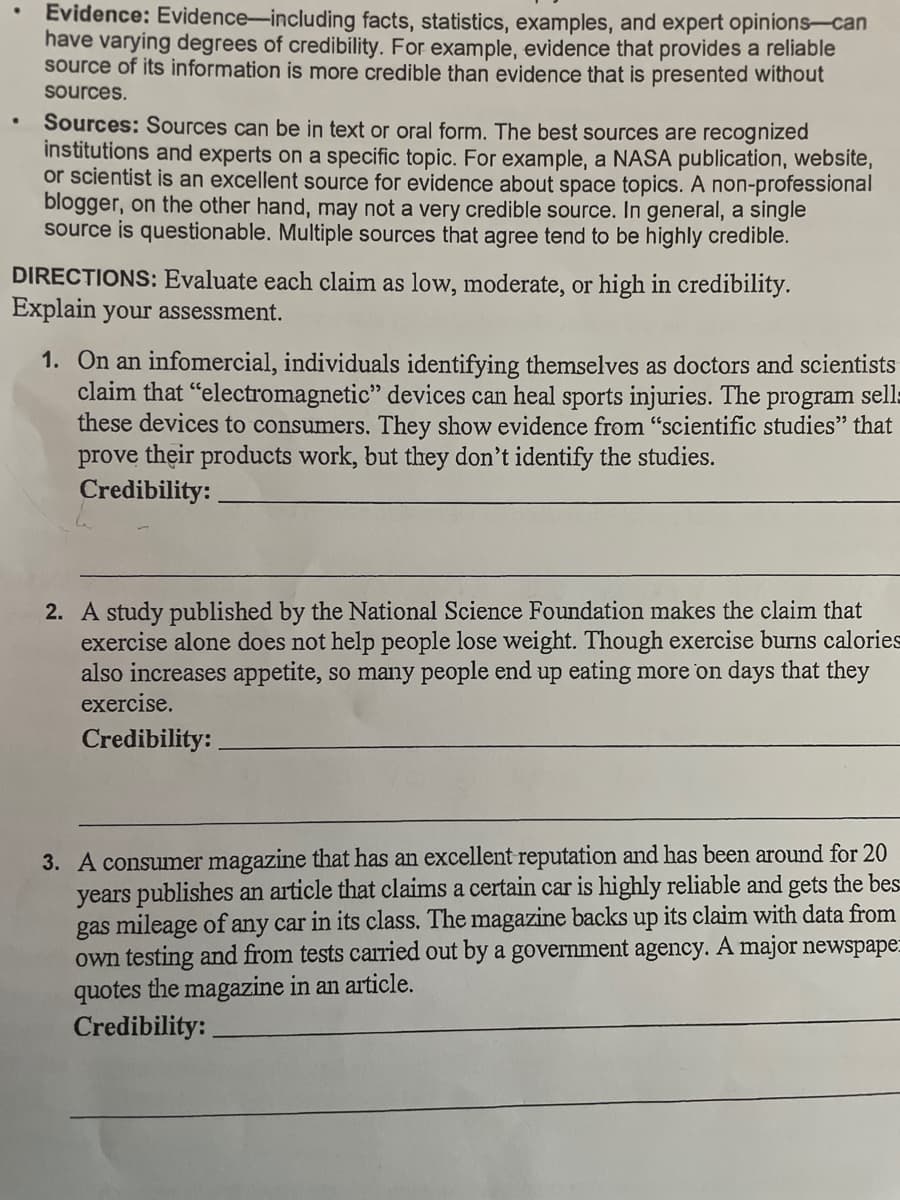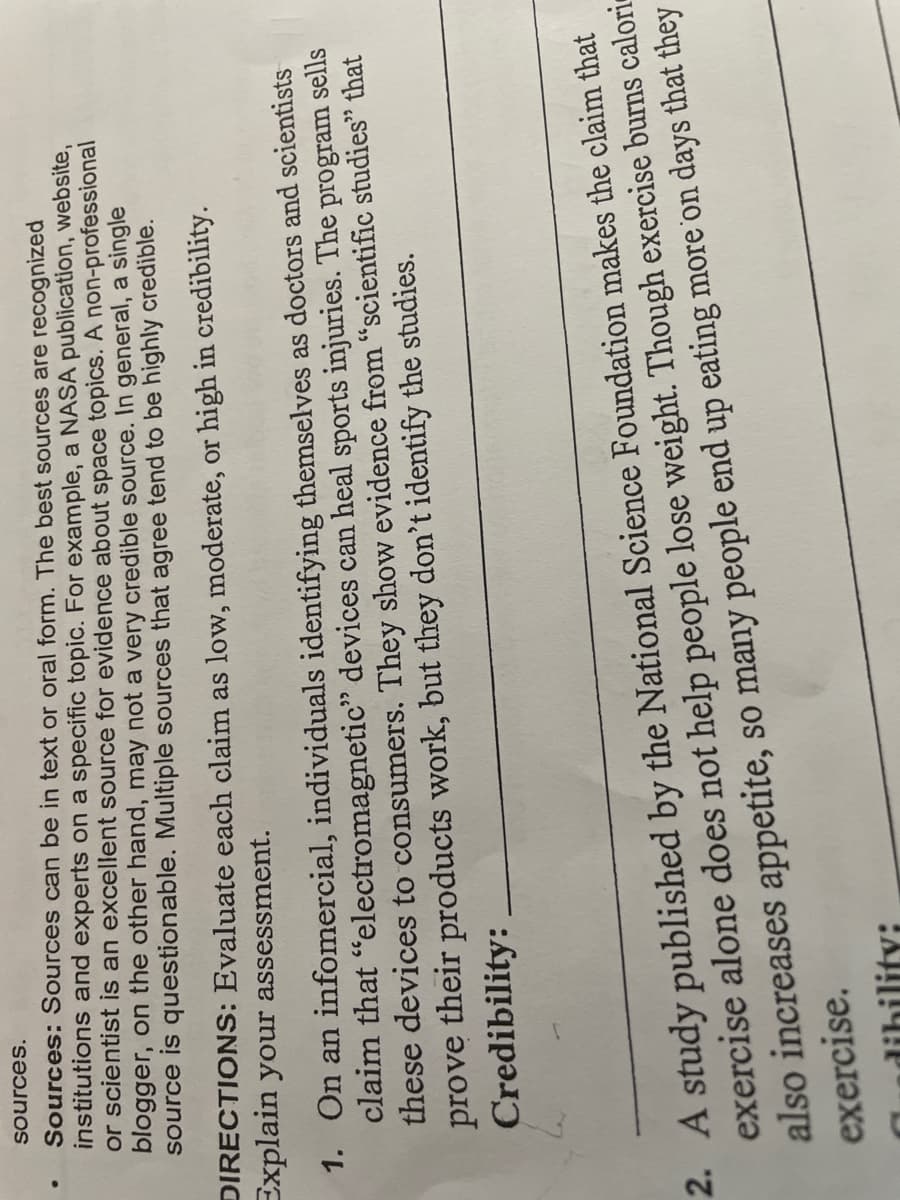Evidence: Evidence-including facts, statistics, examples, and expert opinions-can have varying degrees of credibility. For example, evidence that provides a reliable source of its information is more credible than evidence that is presented without sources. Sources: Sources can be in text or oral form. The best sources are recognized institutions and experts on a specific topic. For example, a NASA publication, website, or scientist is an excellent source for evidence about space topics. A non-professional blogger, on the other hand, may not a very credible source. In general, a single source is questionable. Multiple sources that agree tend to be highly credible. DIRECTIONS: Evaluate each claim as low, moderate, or high in credibility. Explain your assessment. 1. On an infomercial, individuals identifying themselves as doctors and scientists claim that "electromagnetic" devices can heal sports injuries. The these devices to consumers. They show evidence from "scientific studies" that prove their products work, but they don't identify the studies. Credibility: program sell-
Evidence: Evidence-including facts, statistics, examples, and expert opinions-can have varying degrees of credibility. For example, evidence that provides a reliable source of its information is more credible than evidence that is presented without sources. Sources: Sources can be in text or oral form. The best sources are recognized institutions and experts on a specific topic. For example, a NASA publication, website, or scientist is an excellent source for evidence about space topics. A non-professional blogger, on the other hand, may not a very credible source. In general, a single source is questionable. Multiple sources that agree tend to be highly credible. DIRECTIONS: Evaluate each claim as low, moderate, or high in credibility. Explain your assessment. 1. On an infomercial, individuals identifying themselves as doctors and scientists claim that "electromagnetic" devices can heal sports injuries. The these devices to consumers. They show evidence from "scientific studies" that prove their products work, but they don't identify the studies. Credibility: program sell-
Social Psychology (10th Edition)
10th Edition
ISBN:9780134641287
Author:Elliot Aronson, Timothy D. Wilson, Robin M. Akert, Samuel R. Sommers
Publisher:Elliot Aronson, Timothy D. Wilson, Robin M. Akert, Samuel R. Sommers
Chapter1: Introducing Social Psychology
Section: Chapter Questions
Problem 1RQ1
Related questions
Question
100%

Transcribed Image Text:Evidence: Evidence-including facts, statistics, examples, and expert opinions-can
have varying degrees of credibility. For example, evidence that provides a reliable
source of its information is more credible than evidence that is presented without
sources.
Sources: Sources can be in text or oral form. The best sources are recognized
institutions and experts on a specific topic. For example, a NASA publication, website,
or scientist is an excellent source for evidence about space topics. A non-professional
blogger, on the other hand, may not a very credible source. In general, a single
source is questionable. Multiple sources that agree tend to be highly credible.
DIRECTIONS: Evaluate each claim as low, moderate, or high in credibility.
Explain your assessment.
1. On an infomercial, individuals identifying themselves as doctors and scientists
claim that "electromagnetic" devices can heal sports injuries. The program sell:
these devices to consumers. They show evidence from "scientific studies" that
prove their products work, but they don't identify the studies.
Credibility: .
2. A study published by the National Science Foundation makes the claim that
exercise alone does not help people lose weight. Though exercise burns calories
also increases appetite, so many people end up eating more on days that they
exercise.
Credibility:
3. A consumer magazine that has an excellent reputation and has been around for 20
years publishes an article that claims a certain car is highly reliable and gets the bes
gas mileage of any car in its class. The magazine backs up its claim with data from
own testing and from tests carried out by a government agency. A major newspape:
quotes the magazine in an article.
Credibility:

Transcribed Image Text:sources.
Sources: Sources can be in text or oral form. The best sources are recognized
institutions and experts on a specific topic. For example, a NASA publication, website,
or scientist is an excellent source for evidence about space topics. A non-professional
blogger, on the other hand, may not a very credible source. In general, a single
source is questionable. Multiple sources that agree tend to be highly credible.
DIRECTIONS: Evaluate each claim as low, moderate, or high in credibility.
Explain your assessment.
1. On an infomercial, individuals identifying themselves as doctors and scientists
claim that "electromagnetic'" devices can heal sports injuries. The program sells
these devices to consumers. They show evidence from "scientific studies" that
prove their products work, but they don't identify the studies.
Credibility:
2. A study published by the National Science Foundation makes the claim that
exercise alone does not help people lose weight. Though exercise burns calori«
also increases appetite, so many people end up eating more 'on days that they
exercise.
dibility:
Expert Solution
Introduction:
We'll answer the first question since the exact one wasn't specified. Please submit a new question specifying the one you'd like answered.
Since, doctors and scientists make this claim, who are experts in their fields, the credibility becomes high. Also, they are providing evidence from "scientific studies" to prove their point, which also improves credibility. But, since they don't identify the studies, and since the evidence which is provided with a source is more credible than the evidence which is provided without the source, the credibility of the above claim gets lowered.
Trending now
This is a popular solution!
Step by step
Solved in 2 steps

Recommended textbooks for you

Social Psychology (10th Edition)
Sociology
ISBN:
9780134641287
Author:
Elliot Aronson, Timothy D. Wilson, Robin M. Akert, Samuel R. Sommers
Publisher:
Pearson College Div

Introduction to Sociology (Eleventh Edition)
Sociology
ISBN:
9780393639407
Author:
Deborah Carr, Anthony Giddens, Mitchell Duneier, Richard P. Appelbaum
Publisher:
W. W. Norton & Company

The Basics of Social Research (MindTap Course Lis…
Sociology
ISBN:
9781305503076
Author:
Earl R. Babbie
Publisher:
Cengage Learning

Social Psychology (10th Edition)
Sociology
ISBN:
9780134641287
Author:
Elliot Aronson, Timothy D. Wilson, Robin M. Akert, Samuel R. Sommers
Publisher:
Pearson College Div

Introduction to Sociology (Eleventh Edition)
Sociology
ISBN:
9780393639407
Author:
Deborah Carr, Anthony Giddens, Mitchell Duneier, Richard P. Appelbaum
Publisher:
W. W. Norton & Company

The Basics of Social Research (MindTap Course Lis…
Sociology
ISBN:
9781305503076
Author:
Earl R. Babbie
Publisher:
Cengage Learning

Criminalistics: An Introduction to Forensic Scien…
Sociology
ISBN:
9780134477596
Author:
Saferstein, Richard
Publisher:
PEARSON

Sociology: A Down-to-Earth Approach (13th Edition)
Sociology
ISBN:
9780134205571
Author:
James M. Henslin
Publisher:
PEARSON

Society: The Basics (14th Edition)
Sociology
ISBN:
9780134206325
Author:
John J. Macionis
Publisher:
PEARSON